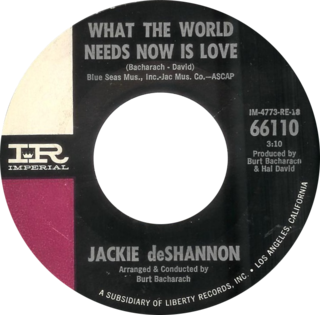
"Déjà Vu" is a hit 1979 ballad written by Isaac Hayes with lyricist Adrienne Anderson, recorded by Dionne Warwick for her album Dionne which Barry Manilow produced. The song won Warwick a Grammy Award for Best Female R&B Vocal Performance at the 22nd Grammy Awards.

"Heartbreaker" is a song by American singer Dionne Warwick. It was written by Barry, Robin and Maurice Gibb of the Bee Gees for her 1982 studio album Heartbreaker, while production was helmed by Barry Gibb, Albhy Galuten and Karl Richardson under their production moniker Gibb-Galuten-Richardson. Barry Gibb's backing vocal is heard on the chorus.

"All the Love in the World" is a song by Dionne Warwick, released as a single in 1982. It was written by The Bee Gees, and was featured on Warwick's hit album Heartbreaker, produced by Barry Gibb, Karl Richardson, and Albhy Galuten. Barry Gibb provides backing vocals on the track. It was Warwick's third single from the album, behind "Heartbreaker" and "Take the Short Way Home". The song just missed the Billboard Hot 100 in the US, but charted at number 16 on the US Adult Contemporary Chart and at number 10 on the UK Singles Chart.

"I'll Never Fall in Love Again" is a popular song by composer Burt Bacharach and lyricist Hal David that was written for the 1968 musical Promises, Promises. Several recordings of the song were released in 1969; the most popular versions were by Dionne Warwick, who took it to number 6 on Billboard magazine's Hot 100 and spent three weeks topping the magazine's list of the most popular Easy Listening songs, and Bobbie Gentry, who topped the UK chart with her recording and also peaked at number 1 in Australia and Ireland, number 3 in South Africa and number 5 in Norway.

"Too Much, Too Little, Too Late" is a song performed by singers Johnny Mathis and Deniece Williams. Lyrics and music were arranged by Nat Kipner and John Vallins. The single was a comeback of sorts for Mathis as his last U.S. top 10 hit was 1964's "What Will Mary Say" and his last U.S. #1 hit was 1957's "Chances Are."

"Superwoman" is a song by R&B singer Karyn White. The song was released from her self-titled debut album in January 1989. It was her second U.S. top ten hit, peaking at number eight, and her second U.S. R&B number-one hit, holding that position for three weeks. It also earned a gold certification from the Recording Industry Association of America (RIAA).

"This Guy's in Love with You" is a song written by Burt Bacharach and Hal David, and recorded by Herb Alpert. Although known primarily for his trumpet playing as the leader of the Tijuana Brass, Alpert sang lead vocals on this solo recording, arranged by Bacharach. An earlier recording of the song was by British singer Danny Williams titled "That Guy's in Love", which appears on his 1968 self-titled album.

"Wonderful! Wonderful!" is a popular music song written by Sherman Edwards, with lyrics by Ben Raleigh. The song was first published in 1956. In the United States, a recording by Johnny Mathis reached number 14 on the Billboard charts. It was Mathis' debut single.

"What the World Needs Now Is Love" is a 1965 popular song with lyrics by Hal David and music composed by Burt Bacharach. First recorded and made popular by Jackie DeShannon, it was released on April 15, 1965, on the Imperial label after a release on sister label Liberty records the previous month was canceled. It peaked at number seven on the US Hot 100 in July of that year. In Canada, the song reached number one.

"One Less Bell to Answer" is a song written by Burt Bacharach and Hal David. Originally written in 1967 for Keely Smith, the song was rediscovered in late 1969 by Bones Howe, the producer for the 5th Dimension, and the song was included on the group's 1970 debut album for Bell Records, Portrait. Lead vocals on the single were sung by Marilyn McCoo.

"Never Gonna Let You Go" is a popular song from 1982 written by the husband-and-wife songwriting team of Cynthia Weil and Barry Mann; Weil wrote the lyrics, while Mann wrote the music. It was first recorded by Dionne Warwick for her 1982 album Friends in Love, then by singer Stevie Woods for his 1982 album The Woman in My Life. However, its best-known rendition was by Brazilian musician and bandleader Sérgio Mendes, on his 1983 self-titled album. That version was sung by Joe Pizzulo and Leeza Miller.
"99 Miles From L.A." is a 1975 single written by Albert Hammond and Hal David and performed by Hammond. The song was Hammond's only number one on the Easy Listening chart as well as his most successful release on the chart. "99 Miles From L.A." spent one week at number one and peaked at number ninety-one on the Billboard Hot 100.

Love Theme from "Romeo and Juliet" is an album by American pop singer Johnny Mathis that was released on July 30, 1969, by Columbia Records. Of its 11 tracks, eight had been hits for other performers earlier that year, and one of the remaining three, "I'll Never Fall in Love Again", would become a huge success for Dionne Warwick several months later.

Raindrops Keep Fallin' on My Head is an album by American pop singer Johnny Mathis that was released on February 25, 1970, by Columbia Records and included several covers of chart hits from the previous year along with 1964's "Watch What Happens" and the 1966 tunes "Alfie" and "A Man and a Woman".

"I'm Stone in Love with You" is a 1972 single by the Philadelphia soul group The Stylistics. The song is noted for lead singer Russell Thompkins Jr.'s distinctive falsetto singing, which he employs through most of the record. The song was written by Thom Bell, Linda Creed, and Anthony Bell.

Friends in Love is an album by American pop singer Johnny Mathis that was released on April 5, 1982, by Columbia Records and included six original songs, two of which were duets with Dionne Warwick.

Once in a While is an album by American pop singer Johnny Mathis that was released on May 23, 1988, by Columbia Records and found him returning to the practice of covering contemporary hits but also mixing in lesser-known songs already recorded by other artists along with a few new ones.

"You'll Never Get to Heaven " is a song composed by Burt Bacharach, with lyrics by Hal David. It was originally recorded by Dionne Warwick in 1964, who charted at number 34 in the US Billboard Hot 100 with her version. It was covered by the Stylistics in 1973, who reached number 23 in the US with their cover.

"After You" is a song recorded by Dionne Warwick for her 1979 album Dionne: released as the album's third single in the spring of 1980, "After You" would peak at number 65 on the U.S. Billboard Hot 100. It also reached number 10 on the Adult Contemporary chart.

"Easy Love" is a song by Dionne Warwick from her 1980 album No Night So Long. It was the second of two charting singles from the LP.



















